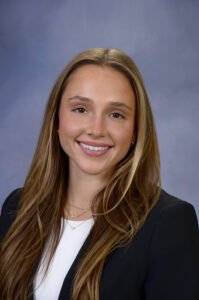
Name: Jacqueline Snyder
Class Year: 2025
Title: Analyst
Organization Name: Lloyds Bank
1. In one sentence, what does your job entail?
My job gives me the opportunity to experience 4 different areas of corporate banking, where Excel and PowerPoint are very prevalent as I analyze financial data and market trends and support senior bankers across various business lines during my rotational program.
2. What planned and unplanned events connected you to your industry and your first employer after Holy Cross? How did you learn/decide it was a good fit for you?
To be honest, I didn’t have a ton of prior knowledge about the recruiting process for finance my sophomore year, so when I started seeing me peers had accepted IB internships in the Winter of 2023 for the Summer of 2024, I went into panic mode. I thought IB was what I wanted to do because naively, that was all I really knew about finance at the time. When I realized I was behind on that recruiting timeline, I noticed the Lloyds application was still open and decided to apply. That turned out to be the best blessing in disguise. While 19 year old me thought that IB was my calling, 22 year old me knows that I would not have enjoyed it in the long run. Instead, Lloyds gave me a chance to step into a rotational analyst program where I could explore different areas of finance that I hadn’t been exposed to before, and I’m so grateful that I was offered the full-time rotational analyst position at Lloyds following the internship. What initially felt like a missed opportunity actually became the exact redirection I needed. I realized Lloyds was the right fit for me because of the culture of the bank and how the role enables me to combine the things I love – the analytical side of numbers and the people side of engaging in conversations and building relationships.
3. What were you involved in when you were on campus?
I was on the women’s soccer team, a member of Alpha Sigma Nu and the Economics Honors Program, I worked for the Economics Department as a grader, and I volunteered for Big Brother Big Sister and Working for Worcester,.
4. What was your major and how did it affect your career decisions?
I chose Economics as my major because I came into Holy Cross knowing I wanted to eventually work in finance. While my classes didn’t dictate the exact career path I would take, they gave me a strong foundation in how markets and economies operate on a global scale. That perspective has been really valuable during the short time I’ve already grown in my career.
5. What are one or two skills that you developed at Holy Cross that you use in your work?
One of the biggest skills I took from Holy Cross was how I analyze and question things. My economics classes sharpened the way I analyze problems and look for patterns, but it wasn’t just econ, it was the variety of courses outside my major that pushed me to see things from alternative perspectives. That mix in the curriculum taught me not to get stuck in one way of thinking, and that’s something I use every day in my work. Additionally, and I think most importantly, I appreciate Holy Cross’s focus on developing the whole person. It wasn’t just about academics, it was about how you engage with people, how you listen, and how you form meaningful relationships. Those experiences have shaped the way I work with others and approach conversations, which has been just as important as any technical skill I’ve learned.
6. What advice do you have for students on campus today?
I would network with alumni as much as possible. That’s how I learned more about finance and about the internship role I was applying to at Lloyds. In my opinion, our alumni network is one of the best aspects of Holy Cross and I have found it to be an amazing asset. Personally, I found Holy Cross alumni in fields that I was interested in through LinkedIn and reached out to them to set up a call. In hindsight, those conversations taught me more about finance and the process of getting a job than any of the research I tried to do on my own.
7. What are your thoughts on how AI has impacted or will impact your industry? What advice do you have for students as they prepare to enter a professional world where AI is prevalent?
Everyone is implementing AI into their daily work, regardless of the industry, so learning how to use it to your advantage has become a staple in the workplace. I would recommend familiarizing yourself with it sooner rather than later. Learn how to build models through it that can help you to expedite the speed at which you get work done. I haven’t seen AI replace many jobs in my 2 months in the workforce so far, but it is definitely being used to automate some day-to-day tasks.

